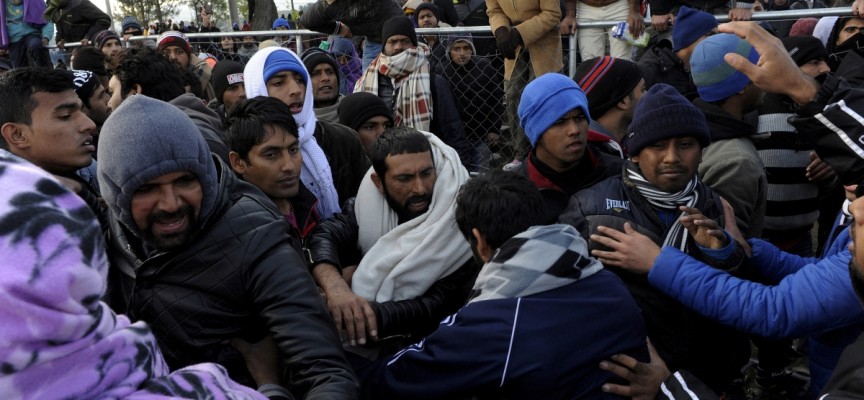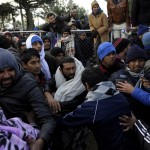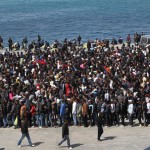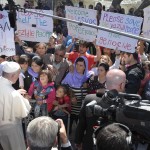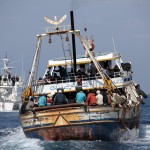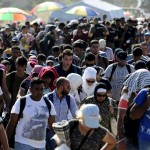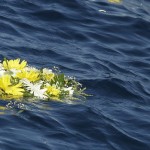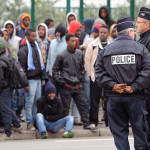“How can Europe leave us here?”. I came back from Idomeni a week ago and this question is still haunting me. Ali did not have an angry grim as he was saying these words; hidden by a crumpled peaked cap, maybe his eyes betrayed resignation, exhaustion, but no resentment. “Please – he told us in very good English – tell your friends, your families, what is happening to all of us: we have been living here for a month without a shower, toilets, nothing. Make it known to the Pope, who is fighting so much for us. Rather than living like this, it is better to go back and die by a bomb”. Ali, 68, a Syrian from Damascus, did not know that in those same hours Pope Francis had announced his visit to the island of Lesbos, as if answering to his invitation. The man had welcomed us by the remains of the fire lighted in the night to get some warm, near the tent in which he lives, a few hundred meters from the Greek-Macedonian border. Like him, some other eleven thousand people have been stranded in this corner of Europe, for over a month. According to some data given by UNICEF, there are 2,000 unaccompanied minors among them, often held in actual detention.
“How can Europe leave them there?”. This is not just the question asked by Ali, but it is the question of anyone who has walked on the mud and the dust in Idomeni.
As these days in Greece the debate is not only about the future of the 53,000 asylum seekers who have remained “stuck” after the closure of the borders, or of those who will be sent back to Turkey; the debate is about the very image of Europe in the eyes of the world.
Who can really believe that 53 thousand people are a problem for a continent of 500 million people? And an even smaller issue for Europe are the two thousand (2000!) migrants living in the Macedonian and Serbian camps. It is really so that there is no alternative for them than a nerve-wracking and endless waiting? Because this is what Ali is condemned to, together with the young Hassan, who escaped from Aleppo and Rym with her children and a husband who is already in Germany. They all wait for a resettlement plan that will take them they do not know where (they will not be allowed to decide) and above all when. And there are all those who do not belong to the resettlement rates: Afghans, Pakistanis, Somalis, and Moroccans. Their only hopes are traffickers or the risks of an illegal journey through the mountains.
“What is said in Europe about what is happening here?” Ali asked. “Is it possible that Europe, known as the birthplace of the rights has accepted all this?”. I did not answer because I should have said that in Berlin, in Milan, in Paris and in Madrid there is little care about what is happening inside EU’s borders. I should also have said that despite some politicians have been hiding for months behind the phrase “economic migrants no, refugees yes”, no agreement has been found even for those who flee from ISIS. We prefer to put up barriers and look elsewhere, forgetting that we have come to this point exactly because there was no willingness to act before: with diplomacy, with humanitarian corridors, with cooperation. But, above all, with one voice. Perhaps the most inconvenient truth of this entire crisis is that the Europe migrants appeal to does not exist or, perhaps, never existed.
“Come può l’Europa lasciarci qui?”. Sono tornato da Idomeni da una settimana e questa domanda ancora mi tormenta. Alì non aveva la faccia arrabbiata mentre pronunciava queste parole; forse i suoi occhi, nascosti dalla visiera sgualcita di un cappello da baseball, tradivano rassegnazione, stanchezza, ma non certo risentimento. “Per favore – ci ha confidato in un inglese pulito – raccontate ai vostri amici, alle vostre famiglie, quello che sta succedendo a tutti noi: da un mese viviamo qui senza una doccia, servizi igienici, nulla. Fatelo sapere al Papa che tanto si sta battendo per noi. Piuttosto che vivere così è meglio tornare e morire sotto una bomba”. Alì, 68 anni, siriano di Damasco, non poteva sapere che papa Francesco in quelle stesse ore avrebbe annunciato la sua visita all’isola di Lesbo, quasi a rispondere al suo invito. L’uomo ci aveva accolto attorno ai resti del fuoco acceso nella notte per scaldarsi, a pochi metri dalla tenda in cui vive a poche centinaia di metri dal confine greco-macedone. Come lui altre undicimila persone che, da oltre un mese, sono bloccate in questo angolo d’Europa. Tra loro, secondo quanto dichiarato dall’Unicef, anche duemila minori non accompagnati, in molti casi tenuti in forme di vera e propria detenzione.
“Come può l’Europa lasciarli lì?”. Questa non è solo la domanda che si pone Alì, ma è la domanda di qualsiasi uomo sia passato a calcare il fango e la polvere di Idomeni.
Perché in discussione in questi giorni in Grecia non è solo il futuro dei 53 mila richiedenti asilo che sono rimasti “bloccati” dopo la chiusura delle frontiere o di quanti verranno rimandati in Turchia, ma l’immagine stessa dell’Europa agli occhi del mondo.
Chi può davvero pensare che 53 mila persone siano un problema per un continente di 500 milioni di abitanti? E ancor meno lo sono i duemila (2.000!) migranti accolti nei campi di Macedonia e Serbia. Davvero per loro non c’è alternativa a una snervante e infinita attesa? Perché è questo ciò a cui è condannato non solo Alì, ma anche il giovane Hassan, scappato da Aleppo, e Rym con i suoi figli e un marito già in Germania. Aspettano un piano di ricollocamenti che non si sa dove li porterà (a loro non sarà consentito di decidere) e soprattutto quando. Poi ci sono quelli che non rientrano nelle quote: afghani, pakistani, somali, marocchini. Per loro l’unica speranza restano i trafficanti o i rischi di un viaggio illegale attraverso i monti.
“Cosa si dice in Europa di quanto sta accadendo qui?”, chiedeva ancora Alì. “Possibile che l’Europa, conosciuta come la patria dei diritti, accetti tutto questo?”. Ho preferito non rispondere perché avrei dovuto dire che a Berlino come a Milano, a Parigi come a Madrid importa poco di quanto sta avvenendo dentro i confini dell’Unione; che nonostante alcuni politici si nascondano da mesi dietro la frase “migranti economici no, ma profughi sì”, l’accordo non si riesce a trovare nemmeno per chi scappa dall’Isis. Si preferisce alzare barriere e guardare dall’altra parte, dimenticando che si è arrivati a questo punto proprio perché non si è voluto agire prima: con azioni diplomatiche, con corridoi umanitari, con la cooperazione. Ma, soprattutto, con una voce sola. Forse la verità più scomoda di tutta questa crisi è che l’Europa a cui si appellano i migranti non esiste o, forse, non è mai esistita.
Michele Luppi
www.africaeuropa.it
Latest posts by Michele Luppi (see all)
- How can Europe do that? - 16 aprile 2016
- A raw nerve in european consciousness - 23 luglio 2015
- The cry of the dead of Garissa - 18 aprile 2015

